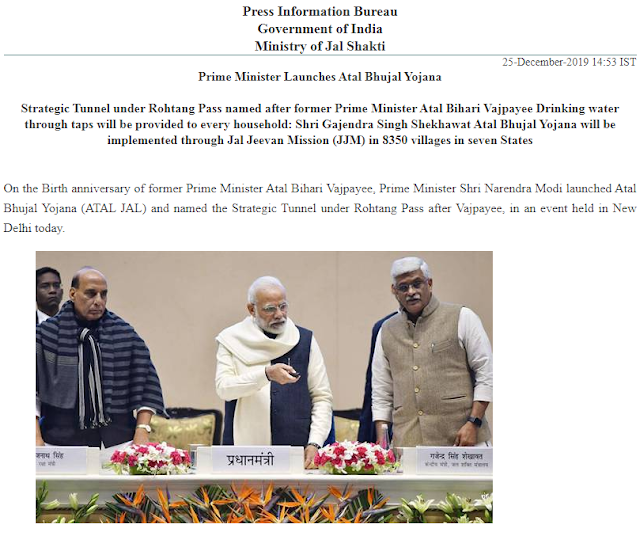Atal Ground Water Scheme
The Atal Bhujal Yojana (Atal Ground Water Scheme) is a Central Sector Scheme launched by the Government of India in December 2019. The scheme is aimed at improving groundwater management in priority areas in seven states: Gujarat, Haryana, Karnataka, Madhya Pradesh, Maharashtra, Rajasthan, and Uttar Pradesh. The objective of the scheme is to promote sustainable groundwater management practices and encourage community participation in water resource management. Here are the key features and objectives of the Atal Bhujal Yojana:
Atal Ground Water Scheme's Objectives:
1. Sustainable Groundwater Management: The primary goal of the scheme is to promote sustainable groundwater management through community participation and the adoption of efficient water use practices.
2. Behavioral Change: Atal Bhujal Yojana focuses on bringing about behavioral changes in the communities, emphasizing the importance of water conservation, recharge, and efficient utilization of groundwater resources.
3. Capacity Building: The scheme aims to build the capacity of stakeholders, including communities and local institutions, to enable them to actively participate in groundwater management activities.
4. Data Collection and Monitoring: Atal Bhujal Yojana focuses on collecting data related to groundwater levels, quality, and other relevant parameters. Regular monitoring and assessment are crucial for informed decision-making.
5. Promotion of Participatory Groundwater Management: The scheme encourages the formation of Water User Associations (WUAs) to promote participatory groundwater management at the local level. WUAs play a vital role in decision-making related to water usage and conservation practices.
Key Components of Atal Ground Water Scheme:
1. Hydro-geological Studies: Conducting hydro-geological studies to assess the groundwater situation, identify recharge zones, and understand the groundwater dynamics in the selected areas.
2. Pilot Projects: Implementing pilot projects for groundwater recharge and demand-side management in specific demonstration areas to showcase effective water conservation practices.
3. Capacity Building: Building the capacity of stakeholders, including WUAs, through training and awareness programs to enhance their understanding of groundwater management techniques.
4. Incentives for Efficient Water Use: Providing incentives to farmers and communities practicing efficient water use and promoting crop diversification that requires less water.
5. Community Participation: Encouraging active participation of communities, especially women, in decision-making processes related to groundwater management.
6. Information, Education, and Communication (IEC): Conducting IEC activities to create awareness about the importance of groundwater conservation and efficient water use practices.
The Atal Bhujal Yojana is a significant step towards ensuring the sustainable use of groundwater resources in critically affected areas, thereby enhancing water security and livelihoods of the communities dependent on groundwater.
